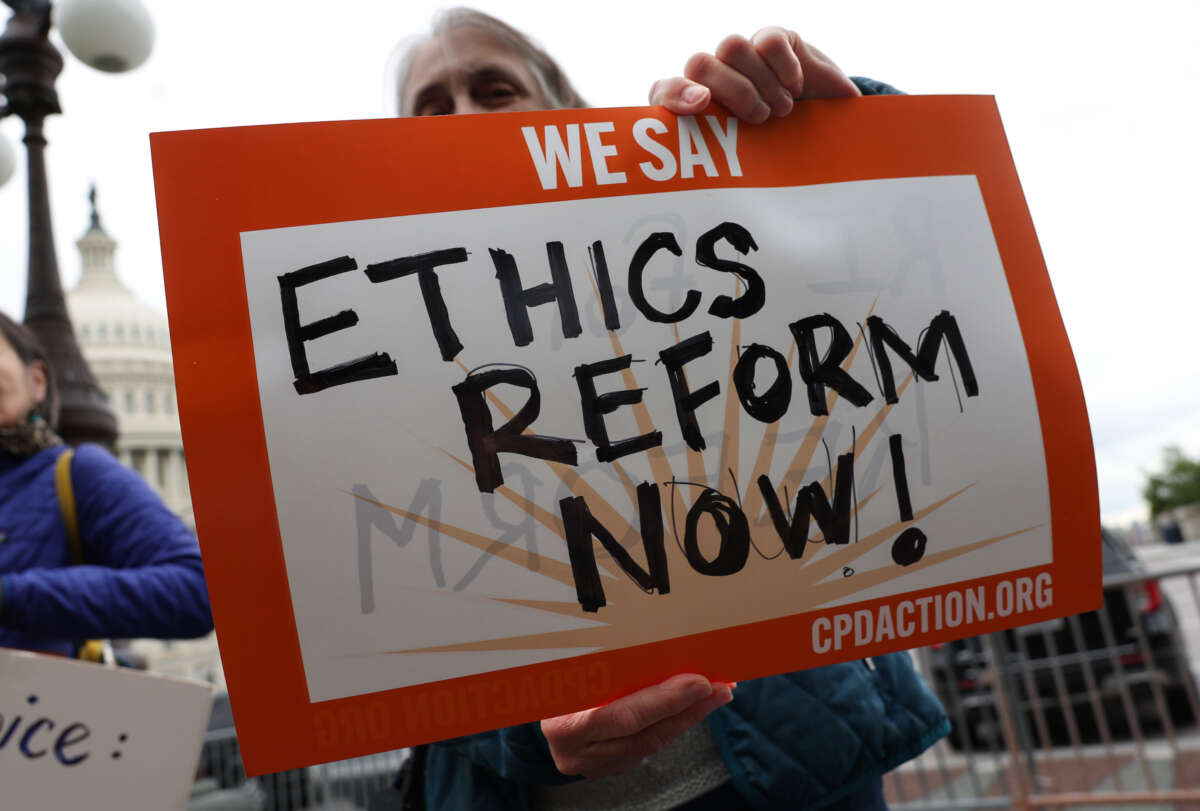Support justice-driven, accurate and transparent news — make a quick donation to Truthout today!
As the public deals with the consequences of the Supreme Court’s decision to overturn 50 years of precedent protecting abortion rights across the country, trust in the Supreme Court has hit an all-time low, new polling by Associated Press-NORC Center for Public Affairs Research at the University of Chicago finds.
The latest installment of the General Social Survey, which NORC has conducted since 1973, polled Americans between May and December of last year — the period immediately following the leak of the Supreme Court decision to overturn Roe v. Wade.
The polling found, perhaps unsurprisingly, that trust in the High Court took a nosedive last year. Just 18 percent of Americans said that they had a “great deal” of confidence in the Supreme Court last year, down from 26 percent in 2021. The amount of people with “only some” confidence dropped from 53 percent in 2021 to 46 percent in 2022.
Meanwhile, the proportion of people who said they had “hardly any” confidence in the Supreme Court exceeded the proportion who said they had a “great deal” of confidence for the first time in the poll’s history. A record 36 percent of respondents said they had “hardly any” trust in the Court, up 15 points from 2021.
Trust was lowest among Democrats. The proportion of Democrats with a “great deal” of confidence fell to a mere 8 percent in 2022, down from 25 percent the previous year. Confidence even fell among Republicans, despite the High Court being dominated by right-leaning justices, dropping from 31 percent in 2021 to 26 percent in 2022.
The polling demonstrates the crisis in confidence that the far right Supreme Court justices have brought onto the institution. Even aside from the questionable logic and legal basis behind the Dobbs v. Jackson ruling, the Court’s radical decision to yank away the right to bodily autonomy despite the longtime precedent set by Roe has yielded disastrous consequences for the public and people’s right to bodily autonomy, both for abortion seekers and for pregnant people seeking regular care.
The poll results also show how polarizing and unpopular the concept of banning abortion is when it becomes a reality. Opinions on abortion rights likely helped fuel the negative attitudes toward the Supreme Court; the polling finds that the proportion of people who agree that a person should be able to obtain a legal abortion for any reason rose above the proportion who do not agree for the first time two years ago. Now, 53 percent of adults believe that abortion access should be open to those who need it.
Previous polls on the Supreme Court after the fall of Roe have yielded similar results. A Gallup poll last September found that approval of the Supreme Court was at just 40 percent, tied with the record low first seen in 2021, while disapproval of the Court was at a record high of 58 percent. (The NORC poll did not ask explicitly about disapproval of the Court.)
These polls, however, were conducted before reporters uncovered a number of instances of extreme corruption from Supreme Court justices — specifically, from justice Clarence Thomas, who Chief Justice John Roberts has worked to shield in recent weeks.
The scandal surrounding Thomas has made the public aware of what has amounted to an open secret among judicial experts: that corruption is much more common among Court justices than the public knows, and that the justices have no interest in changing rules regarding corruption because it benefits them personally.
If the polling were conducted after these revelations, it may have found an even dimmer view of the Supreme Court.
Recent polling from The Economist and YouGov — conducted after the first bombshell ProPublica report on Thomas accepting lavish, undisclosed gifts from a Republican megadonor — found that nearly 6 in 10 Americans disapprove of Thomas’s choice to accept the gifts. Another poll, conducted around the same time by Demand Justice, found that 70 percent of Americans would support an investigation of ethical violations by Supreme Court justices.
A terrifying moment. We appeal for your support.
In the last weeks, we have witnessed an authoritarian assault on communities in Minnesota and across the nation.
The need for truthful, grassroots reporting is urgent at this cataclysmic historical moment. Yet, Trump-aligned billionaires and other allies have taken over many legacy media outlets — the culmination of a decades-long campaign to place control of the narrative into the hands of the political right.
We refuse to let Trump’s blatant propaganda machine go unchecked. Untethered to corporate ownership or advertisers, Truthout remains fearless in our reporting and our determination to use journalism as a tool for justice.
But we need your help just to fund our basic expenses. Over 80 percent of Truthout’s funding comes from small individual donations from our community of readers, and over a third of our total budget is supported by recurring monthly donors.
Truthout has launched a fundraiser, and we have a goal to add 231 new monthly donors in the next 48 hours. Whether you can make a small monthly donation or a larger one-time gift, Truthout only works with your support.
